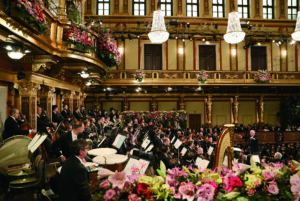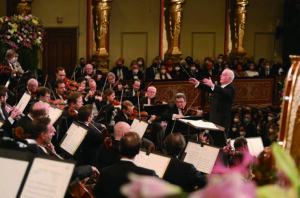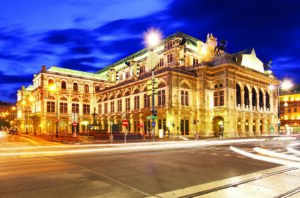노먼 레브레히트 칼럼 l SINCE 2012
영국의 평론가가 보내온 세계 음악계 동향

2022년 빈 신년음악회 ©Vienna Philharmonic/Dieter Nagl

빈 신년음악회 지휘를 맡은 다니엘 바렌보임 ©Vienna Philharmonic/Dieter Nagl
청중을 잃은, 빈 음악계
코로나가 음악계를 습격했다. 여행 산업의 붕괴로 미국과 독일의 오케스트라들은 현명한 선택을 펼치고 있다. 그렇다면 빈은?
1791년 런던을 방문한 하이든(1732~1903)은 자신의 연주회에 표 값을 지불만 하면 모든 이들이 입장할 수 있다는 사실에 기분 좋게 놀랐다. 빈에서 교향악단은 귀족 저택 연회장에서만 연주를 했고, 참석자는 무조건 초대를 받아야 입장할 수 있었다.
런던에서 연주회 표는 ‘여성의 표는 여성에게만, 남성의 표는 남성에게만’ 양도할 수 있었지만, 이를 제외하고는 모두에게 열려 있었다. 런던에서의 연주회를 위해 새로운 작품을 작곡하고, 피아노 앞에 앉아 지휘했던 하이든은 매우 기뻐하며 이렇게 말했다. “저는 지금껏 황제나 왕, 고위 관료 앞에만 섰으며 그들로부터 수많은 찬사를 받았습니다. 하지만 그들과 돈독한 사이가 되기보다는 저와 비슷한 사람들과 함께하고 싶습니다.”
음악사에서 대체로 간과되었던 청중은 모든 작곡가와 연주자만큼이나 음악의 발전에 있어 중요한 역할을 해왔다. 런던의 자유로운 분위기는 1730년대 귀족들에게 버림받은 뒤 비국교도 및 유대인 중산층에게 구약 성서 오라토리오를 선사한 헨델(1685~1759) 덕분이었다.
빈에서는 베토벤(1770~1827)이 그 경계를 허물었다. 그는 교향곡 9번 ‘합창’ 초연을 지배 계급이 모두 지방으로 떠나버린 1824년 5월의 어느 금요일로 정했고, 덕분에 진정한 음악 애호가들로 연주회장을 채울 수 있었다. 베토벤의 교향곡이 보여주는 인류애는 청중에게 분명히 드러났다. 객석에서 비어 있는 곳은 귀빈석뿐이었다.
그럼에도 빈은 아직 새로운 연주회 습관을 얻지 못했다. 자선 및 자비의 발전을 위한 귀족 여성 협회의 분파로 1812년 설립된 빈 악우협회 역시 모든 면에서 제약을 받았다. 1842년 궁정 오페라의 연주자들이 부수입을 얻고 연주의 진가를 인정받기 위해 그들만의 교향악단을 만들면서 변화가 일어났다. 연주자들이 오케스트라석에 파묻히지 않았던 때였다.
같은 해 뉴욕에서는 프리랜서 연주자들의 교향악단이 결성되었다. 둘 다 즉각적인 성공을 거두지는 못했다. 빈 필은 5년간 11번의 연주회밖에 열지 못했고, 뉴욕 필의 경우 베토벤 교향곡 9번을 단 한 번 무대에 올린 뒤로 10년간 두 번째 연주회를 가질 수 없었다.
빈에 변화가 찾아온 것은 1848년 혁명 이후 도시의 벽이 무너지고 부르크 극장·국립 예술대학교·국립 오페라 극장·빈 음악협회 연주홀·왕립 음악원 등 여러 웅장한 예술의 전당에서 위풍당당한 ‘니벨룽의 반지’ 공연이 시작되면서였다. 이제 안락한 중산층들이 아이들을 맡기고 자신만의 저녁 시간을 보낼 공간이 생긴 것이었다.
청중은 말러(1860~1911)가 살던 시대의 오페라로 음악적 변화를 받아들였으며, 특정 작품에 대해 목소리를 내고 정권 교체를 요구하며 신문을 활용하기도 했다. 이 당시에는 고급 예술과 저급 예술 사이의 구분이 없었다. 당대 엽서에는 브람스와 요한 슈트라우스가 카드 게임을 하는 모습이 묘사되기도 했다. 두 사람은 실제로 대부분의 수요일 밤을 그렇게 보냈다. ‘아름답고 푸른 도나우’의 4소절과 함께 “슬프게도 브람스의 것이 아니다”라는 말로 끝맺는 그림에는 연주자의 사인도 포함되었다. 제1차 세계대전 전까지 빈은 모두에게 음악의 용광로나 다름없었다.

빈 슈타츠오퍼
다시 뒤처지기 시작한 빈 음악계
1918년부터 빈은 모든 면에서 창조적으로 뒤처지기 시작했다. 쇤베르크(1874~1951)는 자신의 제2빈악파를 모더니즘이 유행하고 있는 베를린으로 이끌었고, 코른골트(1897~1957)는 할리우드로 떠났다. 나치의 제3제국은 다양성과 실험을 모두 제거했다. 오늘날의 빈은 먼 과거로부터 남겨진 쇠퇴하는 자산으로 연명하고 있으며, 빈 필은 매년 왈츠에만 푹 빠져 있다.
청중은 어디 있냐고? 그들 역시 더는 중요치 않아졌다. 빈의 호시절에는 오페라 극장 및 무지크페어아인 입석에서 청중은 축구팬 마냥 음악을 두고 종종 주먹다짐했다. 시간이 지나자 표 값은 치솟았고 방해꾼들은 쫓겨났다. 오늘날, 빈의 청중 대부분은 여행객이다. 빈은 일본·중국·한국에서 눈부신 마케팅을 펼쳤고, 현지 관객 감소라는 무참한 대가를 치르고 있다.
코로나로 인해 빈 오페라극장의 2/3가 텅 빈 모습은 더 이상 놀랍지 않다. 여행사의 예약이 사라지며 나타난 청중의 부재는 대머리가 된 정수리에 무자비하게 들어 닥친 강풍과도 같다. 빈의 시민들은 자신의 것이 아니며 목소리 또한 낼 수 없는 장소로 향하는 습관을 잃어버린 듯 보인다.
코로나는 예술 기관이 본연의 목적을 재고하고 대중과 다시 연결될 기회를 제공했다. 여행 산업의 붕괴로 미국의 오케스트라들은 미국인 독주자를 찾았으며, 독일 역시 현명한 선택을 펼치고 있다. 뉴욕 필과 베를린 필은 버스로 통근 가능한 거리에 살고 있는 재능 넘치는 젊은 인재들에게 요청하여 마에스트로의 부재를 메울 수 있었다. 반면, 빈은 내륙의 호화로움을 잃었다.
하지만 연주자들을 걱정할 때가 아니다. 지금은 더욱 젊고 다양한 청중과 소통하고, 프로그램을 덜 딱딱하고 변화를 더 잘 수용할 수 있도록 다듬고, 오페라 극장을 단지 전통의 일부라고 선언하는 것 이외에 전제 자체를 재구성하는 시간이 되어야만 한다.
내가 아는 한 지금껏 빈에서 새로운 결정은 나오지 않았다. 오랫동안 등한시된 청중에 대해서라면 분명 그렇다. 코로나 이후, 베를린 필은 호황을 맞이하고 런던 필은 자기계발에 매진하며 뉴욕 필 역시 회복의 길을 걸을 터이다. 세계 음악의 중심지 중 오로지 빈만이 관료적 안일함에 빠진 채 황혼의 길목에 남아 있을 것이다.
번역 evener
노먼 레브레히트 칼럼의 영어 원문을 함께 제공합니다
본 원고는 본지의 편집 방향과 일치하지 않을 수 있습니다
When Joseph Haydn came to London in 1791 he was agreeably surprised to find that his concerts were open to anyone who could afford a ticket. In Vienna, symphonies were played in the ballrooms of aristocratic mansions and attendance was by invitation only.
In London, tickets were only ‘transferable Ladies to Ladies and Gentlemen to Gentlemen’ to avoid immortality; otherwise they were open to all. Haydn, who composed a new work for every London concert and conducted from the keyboard, was delighted. He said: “I have been in the company of emperors, kings and many great gentlemen, and I received many a compliment from them: but I do not want to live on terms of intimacy with such people and prefer to be with people of my class.”
The audience, largely overlooked in music histories, plays as important a role in the development of music as any of its composers and performers. London owed its unstuffiness to Georg Frideric Handel who, abandoned around 1730 by the nobility, reached out to the Nonconformist and Jewish middleclass with Old Testament oratorios.
In Vienna it was Beethoven who broke the barriers. He fixed the Ninth Symphony premiere for a Friday in May 1824 when the ruling class had left for the country and he could fill the theatre with true music lovers. The human brotherhood his symphony proclaimed was evident in the audience. The only empty space in the auditorium was the royal box.
Vienna had yet to acquire a concert habit. The Gesellschaft der Musikfreunde, founded in 1812, was an offshoot of the Noblewomen’s Society for the Advancement of Good and Benevolence, restricted in every respect. The evolution came in 1842, when musicians at the court opera formed their own philharmonic orchestra to attract extra income and a greater appreciation of their skills, when they were not buried in the opera pit.
That same year New York acquired a philharmonic orchestra of freelance musicians. Neither was an instant hit. The Vienna Philharmonic gave just eleven concerts in five years and the New Yorkers, after one performance of Beethoven’s Ninth, could not afford another for a decade.
Vienna’s turning point was the demolition of city walls after the 1848 revolution and the creation of an imposing Ring with grand temples of art – the Burgtheater·Academy of Fine Arts· Opera·the Musikverein concert halls·the University and the Imperial Academy of Music. The comfortable middle classes now had somewhere to spend their evenings and send their children for tuition.
The audience joined the musical process in Gustav Mahler’s era the Opera, both in vociferous responses to certain productions and in its use of newspapers to demand regime change. There was, at this point, no distinction between high art and low. A contemporary postcard shows a silhouette of Johannes Brahms and Johann Strauss playing cards, as they did most Wednesday nights. The symphonist autographed the image with four bars of Blue Danube, signing off with the words ‘sadly not by Johannes Brahms’. Up to the First World War Vienna was a melting pot of music for all.
From 1918, it became creatively irrelevant. Arnold Schoenberg took his Second Vienna School to Berlin where modernism was all the rage. Erich Wolfgang Korngold migrated to Hollywood. The Third Reich killed off diversity and experiment. Today, Vienna lives off dwindling capital of a distant past. Its Opera is routine. The Vienna Philharmonic wallows annually in waltzes.
And the audience? That, too, has ceased to matter. In Vienna’s heyday, the cheap Stehplatz sections of the Opera and Musikverein fought over music like football fans, often with fists raised. Over time, ticket prices rose and disrupters were ejected. The Vienna audience today is packed with package tourists. Vienna has marketed itself brilliantly in Japan, China and South Korea. The price it pays is a loss of local engagement.
Pictures of the Vienna Opera playing two-thirds empty during Covid came as no surprise. Without travel agency bookings, Vienna’s loss of audience was exposed as cruelly as a bald man’s pate in high winds. Viennese, it seemed, had lost the habit of going to places that no longer belonged to them and in which they had no voice.
Covid has offered an opportunity for institutions to rethink their purpose and to reconnect with grass roots. Amid travel disruptions, US orchestras have discovered American soloists and German is making smart choices. New York and Berlin can call on a cornucopia of young talent living a short bus-ride away to jump in for absent maestros. Vienna lacks the luxury of a hinterland.
But artists are the least of their worries. This ought to be a time to connect with a different audience, younger and more diverse; to reconstruct the programme to be less rigid and more attuned to changing needs; to reconfigure the reasons for having an opera house, other than just proclaiming that it’s part of the tradition.
Vienna, so far as I can tell, has done no new thinking, least of all about the audience it has ignored for so long. After Covid, Berlin will boom, London will self-reinvent and New York will bounce back. Vienna, of all the music capitals, will be left in a limbo of administrative complacency, facing twilight.
 글 노먼 레브레히트
글 노먼 레브레히트
영국의 음악·문화 평론가이자 소설가. ‘텔레그래프’지, ‘스탠더즈’지 등 여러 매체에 기고해왔으며, 지금 이 순간에도 자신의 블로그(www.slippedisc.com)를 통해 음악계 뉴스를 발 빠르게 전한다







